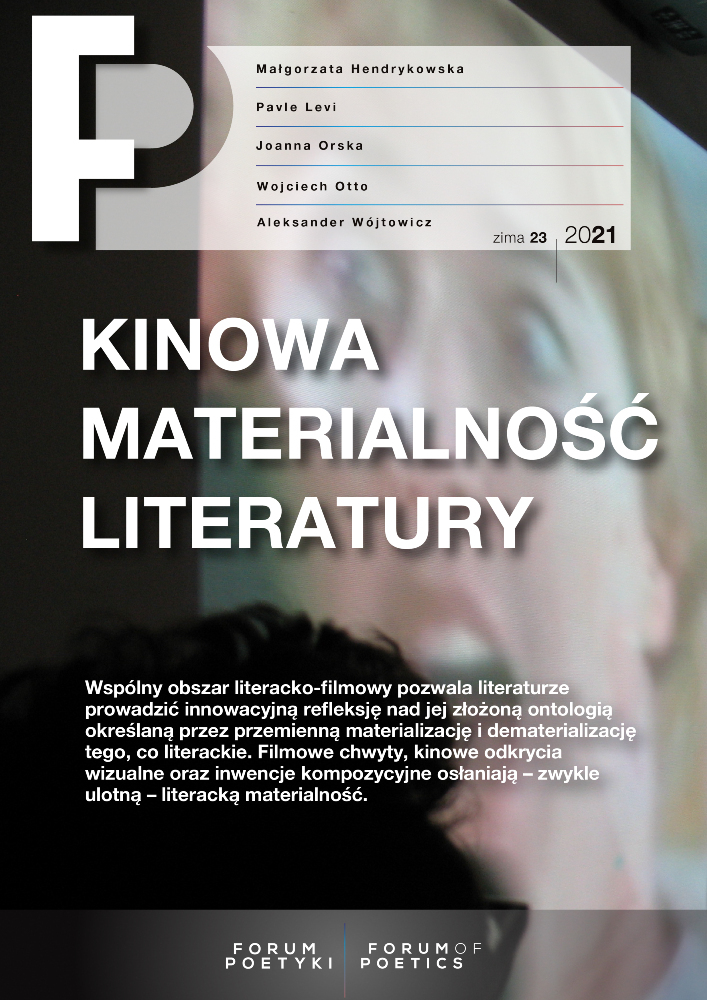No. 23 (2021)
Almost a hundred years ago, Karol Irzykowski, a literary critic and writer, published a pioneering book on the aesthetics of film entitled Dziesiąta Muza [The Tenth Muse]. Irzykowski argued that “cinema makes the interaction between man and matter visible.” It may be an interesting topic for contemporary literary studies, where the materiality of text, the materiality of poetics and/or certain poetical concepts, and the situation in which text points to materiality is currently under discussion. The interactions between literature and film allow literature to reflect on its complex ontology defined by the alternating materialization and dematerialization of the literary. Cinematic techniques, cinematic shots and compositional experiments point to the, sometimes elusive, materiality of literature. It is thanks to film that materiality becomes, as Irzykowski would say, visible and, at times, finds itself at the heart of literature.
The contributors to this issue of Forum of Poetics prove that Irzykowski’s observations could not be more apt. For from the very beginning of film, that is already in the era of silent films, literature captured its materiality and the human-material existential parameters of the modern subject thanks to its close relations to film. That is why we should carefully consider the moment of this first contact between literature and film, which later, it seems, could have been naturalized and ceased to be perceived as dependent on cinema. Indeed, it permanently and strongly defined the ontology of the modern literary work. In the case of poetry, the relations between both were, as the contributors to this issue of Forum of Poetics emphasize, mutual. Wojciech Otto prepared a systematic overview of these relations, identifying the places for possible mechanisms of materialization and dematerialization of the literary as influenced by film. Joanna Orska, in turn, demonstrates that a similar process took place in the early theoretical texts and manifestos of Polish avant-garde constructivist poets (Awangarda Krakowska [Krakow Avant-Garde]). An important context for her remarks is provided by Pavle Levi, who analyzed the poetics of the “written film” of the Serbian artistic avant-garde in the interwar period (a translation of an excerpt from his book is included in this issue of Forum of Poetics). The same applies to prose. Aleksander Wójtowicz analyzes a pre-war cinematic novel by Jan Brzękowski which imitates the script of a silent film and thus engages in an innovative play with the materiality of text. Małgorzata Hendrykowska examines a forgotten article by Stefania Zahorska from the 1930s in which Zahorska comments on how film may enrich literary means of expression, making literature “analytical and sensual.”
The consequences of making the materiality of literature visible through film may be traced further. Polish poets of the New Wave (i.e., the generation of 1968), as Kamila Czaja writes, consciously refer to cinema, discovering the cinematic aspects of poetry. The most modern manifestations of these complex relationships are analyzed by Rafał Koschany, for whom the constant presence of film in contemporary poetry has nothing to do with ekphrasis. Koschany argues that it points to everyday life, to the practice of “talking about movies,” where the filmic, the literary and the material constantly intertwine in new and innovative ways. When it comes to prose, Andrzej Kuśniewicz in his novel Lekcja martwego języka [Lesson of a Dead Language] (1977), analyzed by Antoni Zając, constructs the ontology of the sign-cipher-hologram. Kuśniewicz employed cinematic means of expression to process the subtle presence of the past. In turn, William Gibson’s Neuromancer (1984), a cyberpunk futurological vision strongly inspired by film analyzed by Piotr Prusinowski, may be a manifestation of fear of the progressive dematerialization of life. For Marcin Jauksz, The Piano (1993), based on the clichés found in a Victorian novel, is an auratic adaptation, insofar as film and literature recreate the aura of the 19th century, i.e., the fleeting material aspect of the past, since the film evokes the flickering materiality of literature and film. Respectively, Dorota Kulczycka analyzes the adaptation of the bestselling crime novel by Marco Vichi, demonstrating how cinematic means of expression have become part and parcel of the poetics of the contemporary detective novel and how carefully one must read such a novel in order to capture its cinematic and material aspects.
In addition, we also publish two authorial essays. Hubert Klimko-Dobrzaniecki explains how he “creatively adapted” his short story into a movie, developing an important autobiographical trope for the second time and experiencing the materiality of his own prose differently through film. Marek Hendrykowski, who is to publish a historical novel devoted to the history of Poznań and Wielkopolska, re-arranges the relationship between history and the novel in order to access the materiality of the past anew.
Agnieszka Waligóra’s article as if provides a conclusion for this issue of Forum of Poetics. Waligóra analyzes Jacques Rivette’s experimental film with the help of Gilles Deleuze’s philosophy, demonstrating how the kinetic nature of film can influence every intellectual work in the field of poetics, theory and methodology, insofar as concepts, including poetical concepts, have the dynamics of substances and matter set in motion. The characters of the ancient drama, whom Rivette materializes on screen, aim to accomplish or discover something and thus determine the trajectory of analysis, or as Deleuze puts it, the “logic of meaning,” which will follow the energies and materialities of the concepts acting in the film and literary text.
